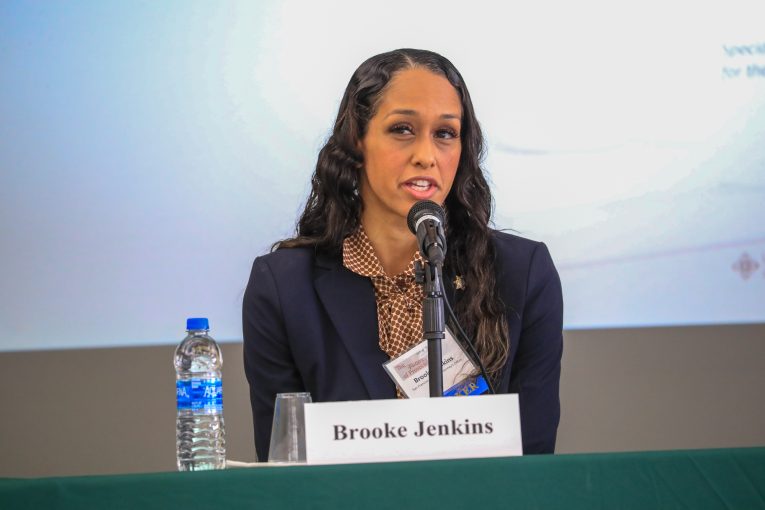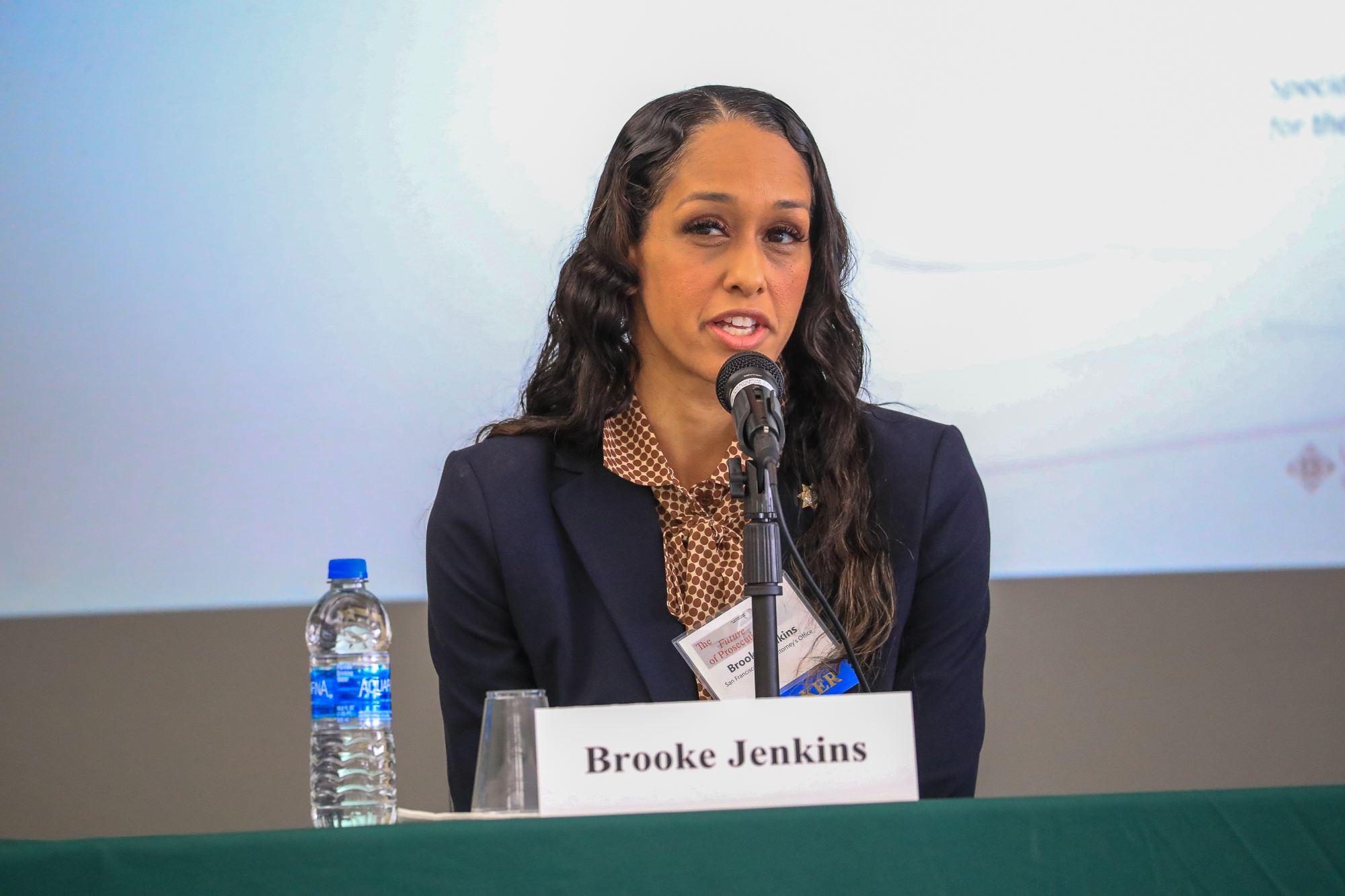

By David M. Greenwald
Executive Editor
San Francisco, CA – In her last case prosecuted case prior to leaving the DA’s office (prior to her appointment as District Attorney), the California Court of Appeal determined that Brooke Jenkins committed misconduct.
Jenkins used this case as the catalyst to join the recall campaign against her former boss, Chesa Boudin.
According to a 20-page ruling, the court found that Jenkins committed prosecutorial misconduct when she misled the jury during closing arguments about her efforts to exclude evidence, and when she attacked defense counsel’s integrity.
The jury originally found Daniel Gudino guilty of murdering his mother, but the People and Gudino stipulated he was not guilty by reason of insanity and he was committed to the State Hospital.
On appeal, Gudino alleges numerous errors including a claim of prosecutorial misconduct  which the court affirmed.
which the court affirmed.
However, the court did not find this misconduct sufficient to reverse the jury’s verdict in the Gudino case.
“Gudino raises several claims and contends the guilty verdict must be reversed,” the court writes. “We address each claim in turn and conclude that none, taken either individually or cumulatively, warrants reversal.”
The court writes, “We agree there was misconduct, but conclude it was not prejudicial.”
They note, “Convictions must be reversed for egregious prosecutor misconduct if the conduct so infected a trial with such unfairness, any resulting conviction violates due process.” However, they add, “Misconduct that does not reach that level may nonetheless violate state law ‘if it involves the use of deceptive or reprehensible methods to persuade the court or jury.'”
Gudino during the trial presented expert testimony from a neuropsychologist who conducted an exam of Gudino three times over the course of nine hours.
The expert diagnosed Gudino “with schizoaffective disorder and concluded his actions the day of the killing were consistent with a person with an impaired perception of reality and with someone who lacked awareness of his actions.”
However, Jenkins challenged the expert’s forensic psychology credentials—she was not board certified in forensic psychology.
During closing argument, the prosecutor made the following statement:
“[The defense] rushed out and paid $5,000 for a psychologist lacking in any meaningful forensic experience, and who has found as her new hobby to testify that criminal defendants charged with murder lack, for one reason or another, the intent to kill when they commit murder, to draft a report and to come in here and testify that you should believe Daniel Gudino when he said on April 12th that he was not conscious, but their job is not to seek justice or to tell the truth about what happened to [Gudino’s mother] on April 12, 2020.”
In addition, the prosecutor argued “the defense’s obligation is to their client; and by any means necessary they seek to have him acquitted of these charges, even if that means using biased, uninformed and untruthful witnesses.”
During her closing argument, Gudino’s counsel repeatedly questioned the prosecutor’s failure to present witnesses who knew about Gudino’s character or his relationship with his mother. Counsel noted the prosecutor “could have brought in witnesses to say that [Gudino and his mother’s relationship] was a bad relationship if they existed, but she didn’t.”
In response, the prosecutor argued “we all know that [Gudino’s mother] can’t take that stand. Everything that [Gudino’s mother] ever said has been excluded from this trial.”
The court found, “None of these remarks resulted in a fundamentally unfair trial or created a reasonable probability of a more favorable result if they had not been made.”
The court added that “even assuming misconduct, no prejudice appears. Courts have determined that an isolated incident of misconduct in a closing argument that otherwise focused on admitted evidence is not prejudicial.”
The court continued, “We agree the prosecutor engaged in misconduct when she said it was not defense counsel’s job ‘to seek justice or tell the truth about what happened,’ and ‘the defense’s obligation is to their client; and by any means necessary they seek to have him acquitted of these charges…’”
The court explained, “Gudino contends the prosecutor committed misconduct during closing arguments by misleading the jury about her efforts to exclude evidence and by attacking defense counsel’s integrity. We agree there was misconduct, but conclude it was not prejudicial.”
They add, “Gudino argues the cumulative effect of the alleged errors at trial warrant reversal of the judgment.”
However, the court disagrees.
“Of the errors assumed or identified—admission of lay opinion testimony and prosecutorial misconduct—both were harmless. Gudino has not demonstrated cumulatively prejudicial error.”
While the court declined to overturn the verdict, the public defender’s office noted “the finding speaks to a pattern of misconduct and dishonesty from the leader of the SF District Attorney’s Office.”
Other incidents of alleged misconduct by Brooke Jenkins:
- 2022: A retired judge filed a Bar Complaint against Jenkins for (a) publicly lying about having no history of misconduct despite a 2014 conviction that was overturned due to her misconduct; (b) misrepresenting her role as a “volunteer” for the campaign to recall Chesa Boudin when she was paid over $100K by orgs related to the recall and its funders;
- 2021: Accessing and sending confidential files —including the rap sheet of Troy McAlister—to her personal email and colleague Don Dubain, prior to both of them departing the DA’s office; Neither one of them had worked on the McAlister prosecution, but both of them used Troy McAlister’s case as a talking point during the campaign to recall Chesa Boudin.
- 2019: Coaching a child witness to testify in a case Jenkins was prosecuting; the trial ended in an acquittal.


Jenkins should be sanctioned and temporarily suspended without pay for her misconduct.
She won’t be.
Unfortunately, at this time, there is no accountability for District Attorneys (D.A.’s) who commit Prosecutorial Misconduct.
The State Bar doesn’t look at D.A.’s as being “regular attorneys,” even though D.A.’s are attorneys and members of the Bar, and as a result, D.A.’s are not held accountable in the same way that an attorney might or should be.
Brooke Jenkins used her position as an assistant D.A. in former head D.A. Chesa Boudin’s office,to undermine him, and, along with her friend, S.F. Mayor London Breed, helped support the impeachment of former S.F. D.A. Chesa Boudin, in order to get him removed from office.
This very same prosecutor, was named by the mayor to replace Chesa Boudin.
Et Tu Brute!
Until some prosecutors suffer real consequences for their misconduct, nothing will change. BTW, my brother voted to recall Boudin because he said that the DA’s Office was in chaos because he was a poor leader. I don’t know if he voted for Jenkins.
That won’t score you any points on this blog.